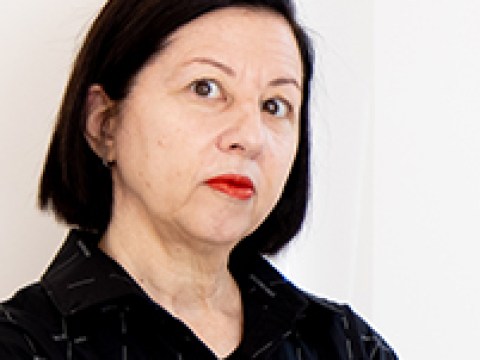An elderly woman reclining in a green lawn chair, blowing smoke into the sky. A pastor in a red corduroy suit grinning at the camera. A couple in their backyard, matching half smiles on their faces.
These are just a few of Texas photographer Gay Block’s portraits of “rescuers,” non-Jewish Europeans who helped to smuggle Jews to safety during World War II — often at great personal risk to themselves. The full collection includes more than 100 photographs, and 28 have come to San Francisco this month.
“Rescuers: Portraits of Moral Courage in the Holocaust” opened at the Jack Fischer Gallery on Sept. 3 and will be on view through Oct. 15. Block will sign copies of the 1992 book of her portraits at the gallery on Sept. 24.
The exhibit is sponsored by Palo Alto–based art collector Pamela Hornik and her husband, David. Hornik first saw Block’s portrait of German aristocrat Countess Maria von Maltzan, another rescuer, last summer at the Fischer Gallery and knew she had to bring the collection to the public, she told J.

“With all the pain and suffering [in the world], now more than ever, it’s important to be reminded that you can be an upstander,” Hornik said.
Hornik is sponsoring the exhibit in memory of her mother, Susan Miller, who was a Holocaust educator at Congregation B’nai Shalom in Walnut Creek in the 1990s.
Block grew up in the Jewish community in Houston and began taking photographs of her friends and neighbors at a young age. She studied photography at the University of Houston with her contemporaries Geoff Winningham, Garry Winogrand and Anne Tucker. Her other work has included a series on girls at Jewish summer camp, female spiritual leaders and her mother. Block, 80, now lives in Santa Fe with her wife, Billie.
“Rescuers” is the result of a collaboration between Block and Santa Barbara Rabbi Malka Drucker that began in 1986. Rabbi Harold Schulweis, the late spiritual leader of Valley Beth Shalom in Encino, suggested the project. He felt that though many Europeans had tried to help Jews, no one was paying attention to these people, according to Block. (The State of Israel has been honoring those who helped Jews escape persecution during the Holocaust as “Righteous Among the Nations” since 1953.)
Block and Drucker visited 11 countries and interviewed 105 individuals over the course of three years. They published their work, along with Block’s photographs, as a book in 1992.
“I never wanted to stop meeting [the rescuers],” Block said in an interview.
“Rescuers” premiered at the Museum of Modern Art in New York in 1992 to critical acclaim. Since then, it has been shown at more than 50 museums, universities and galleries. Block tried to speak at as many venues as possible, she said.
“So many students have never heard of the Holocaust, obviously not about rescuers” she said. “That was amazing. I wanted … to make sure people knew what had happened.”
One rescuer whom Block photographed in 1988, a Polish and Jesuit diplomat named Jan Karski, told her his story demonstrates that the whole world was not against the Jews. “Jewish children must learn about the rescuers so they do not lose faith in humanity,” he said. “Over one-half million Jews survived in Europe, and most of them were helped by individuals.” (Karski is the subject of a new film, “Remember This,” that premiered at the San Francisco Jewish Film Festival in July.)

On display at the Fischer Gallery this month is Block’s favorite image: her portrait of the now deceased Zofia Baniecka, a member of the Polish resistance during World War II. Block and Drucker interviewed Baniecka in 1986 at the Staten Island home of one of the Jews she helped to save. During the war, Baniecka was a liaison to the Polish Underground State, a union of resistance organizations. She sheltered Jewish families in her apartment, sometimes many at a time, and helped to find hiding places for Jewish children across Warsaw.
She told Block, “I was afraid, but I had to do it.”
This is the second time the “Rescuers” series will be shown in the Bay Area. In 1994, the photographs hung at the Magnes Collection of Jewish Art and Life in Berkeley.
For both Block and Hornik, “Rescuers” is almost more relevant today than it was 30 years ago, with antisemitism in the United States at a record high, according to the ADL.
“I think now, more than ever, is a time to stand up for others,” Hornik said.







